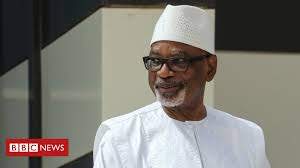Mali’s President Ibrahim Boubacar Keïta has resigned, after being detained by soldiers on Tuesday, state TV reports.
In a televised address, Mr Keïta said he was also dissolving the government and parliament.
“I want no blood to be spilled to keep me in power,” he added.
It comes hours after he and Prime Minister Boubou Cissé were taken to a military camp near the capital Bamako, drawing condemnation from regional powers and France.
“If today, certain elements of our armed forces want this to end through their intervention, do I really have a choice?” said Mr Keïta.
Earlier, the mutinying soldiers took control of the Kati camp.
There has been anger among troops about pay and over a continuing conflict with jihadists – as well as widespread discontent with the former president.
Mr Keïta won a second term in elections in 2018, but there has been anger over corruption, the mismanagement of the economy and the rise of communal violence in areas of the country.
It has prompted several large protests in recent months. A new opposition coalition led by the conservative Imam, Mahmoud Dicko, has called for reforms after rejecting concessions from Mr Keïta, including the formation of a unity government.
What do we know about the mutiny?
It was led by Col Malick Diaw – deputy head of the Kati camp – and another commander, Gen Sadio Camara, BBC Afrique’s Abdoul Ba in Bamako reports.
After taking over the camp, about 15km (nine miles) from Bamako, the mutineers marched on the capital, where they were cheered by crowds who had gathered to demand President Keïta’s resignation.
On Tuesday afternoon they stormed his residence and arrested the president and his prime minister – who were both there.
The president’s son, the speaker of the National Assembly, the foreign and finance ministers were reported to be among the other officials detained.
The number soldiers taking part in the mutiny is unclear.
Kati camp was also the focus of a mutiny in 2012 by soldiers angry at the inability of the senior commanders to stop jihadists and Tuareg rebels taking control of northern Mali.
bbc.com
 Home Of Ghana News Ghana News, Entertainment And More
Home Of Ghana News Ghana News, Entertainment And More





